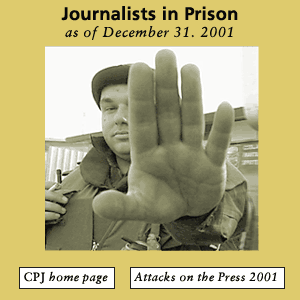
Attacks on the Press 2001: Journalists in Prison
There were 118 journalists in prison around the world at the end of 2001 who were jailed for practicing their profession. The number is up significantly from the previous year, when 81 journalists were in jail, and represents a return to the level of 1998, when 118 were also imprisoned.
Journalists sentenced for defaming foreign minister
New York, February 19, 2002—The Committee to Protect Journalists (CPJ) deplores the suspended prison sentences and fines imposed last week on two journalists from the weekly Le Journal Hebdomadaire. On February 14, a Casablanca court of appeals convicted Abou Bakr Jamai, publications director of Le Journal Hebdomadaire, and Ali Ammar, the newspaper’s general director, of…
Magazine confiscated
New York, May 8, 2002—The Committee to Protect Journalists (CPJ) condemns the Monday, May 6, confiscation of the intellectual and political magazine Wijhat Nadhar. Wijhat Nadhar editor El-Mostafa Soulaih told CPJ that staff contacted him from Al-Najah al-Jadidah printing press in Casablanca and told him that agents from the secret service, the Direction de la…
Journalists harassed over Ben Barka coverage
New York, July 13, 2001 — CPJ is disturbed by the recent Moroccan government harassment of Alain Chabod, deputy chief editor of France 3 Public Television, and Ali Lmrabet, director of the Moroccan weekly Demain Magazine, as well as by the temporary freeze on the printing of Demain. Moroccan secret service (DST) agents began following…
Attacks on the Press 2000: Table of Contents
PREFACE by Peter Arnett INTRODUCTION by Ann Cooper REGIONAL ANALYSES: Africa | Americas | Asia | Europe and Central Asia | Middle East and North Africa AFRICA country summaries Angola | Benin | Burkina Faso | Burundi | Cameroon | Chad | Democratic Republic of Congo | Eritrea | Ethiopia | Gambia | Ghana |…
Attacks on the Press 2000: Middle East and North Africa Analysis
ALTHOUGH RIGHTS TO FREE EXPRESSION AND PRESS FREEDOM are enshrined in national constitutions from Algeria to Yemen, governments found many practical ways to restrict these freedoms. State ownership of the media, censorship, legal harassment, intimidation, and imprisonment of journalists were again among the favored tools of repression and control. In Iraq, Libya, Saudi Arabia, Syria,…
Attacks on the Press 2000: Algeria
LATE IN THE YEAR, A SURGE OF POLITICAL VIOLENCE FURTHER DIMMED the prospects of President Abdel Aziz Bouteflika’s plan for national reconciliation and an end to Algeria’s nine years of civil strife. Particularly in Algiers and other cities, however, the country was far more peaceful than in previous years, and the intense government censorship and…
Convicted of criminal defamation, two journalists face jail and crippling fines
Your Majesty: The Committee to Protect Journalists (CPJ) is deeply alarmed by the prison sentences and harsh financial penalties handed down on March 1 against two journalists at the weekly Le Journal Hebdomadaire. Abou Bakr Jamai, publications director of Le Journal Hebdomadaire and Ali Ammar, the newspaper’s general director, were convicted of defaming Foreign Minister Muhammed Ben Aissa and sentenced to jail terms of three and two months, respectively. Both men were also ordered to pay fines and damages totaling 2,020,000 Dirhams (about US$200,000). The charges stemmed from articles published last year in Le Journal Hebdomadaire’s now-defunct weekly predecessor, Le Journal. These had alleged that Ben Aissa profited from the purchase of an official residence during his tenure as Morocco’s ambassador to the United States in the late 1990s.
Three newspapers banned for alleging prime minister’s involvement in 1972 coup attempt
Your Majesty: The Committee to Protect Journalists (CPJ) is writing to protest the Moroccan government’s decision to ban the weekly newspapers Demain, Le Journal, and Al-Sahiffa. On December 2, the government released a statement saying the three newspapers were banned because they had attacked “the most sacred institutional bases of our country” and threatened “the stability of the state.” The statement added: “In insulting reality … and fabricating history, these papers have created doubt and sowed confusion in the spirit of Moroccans.”